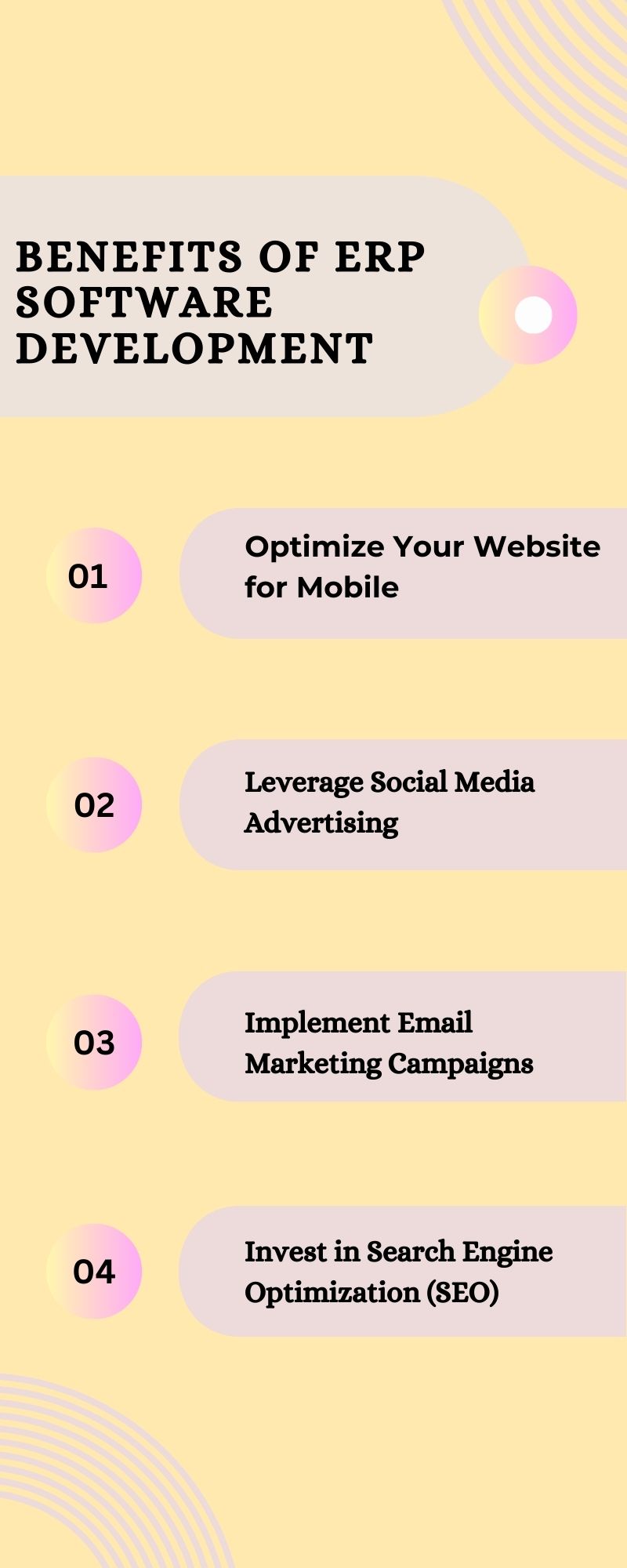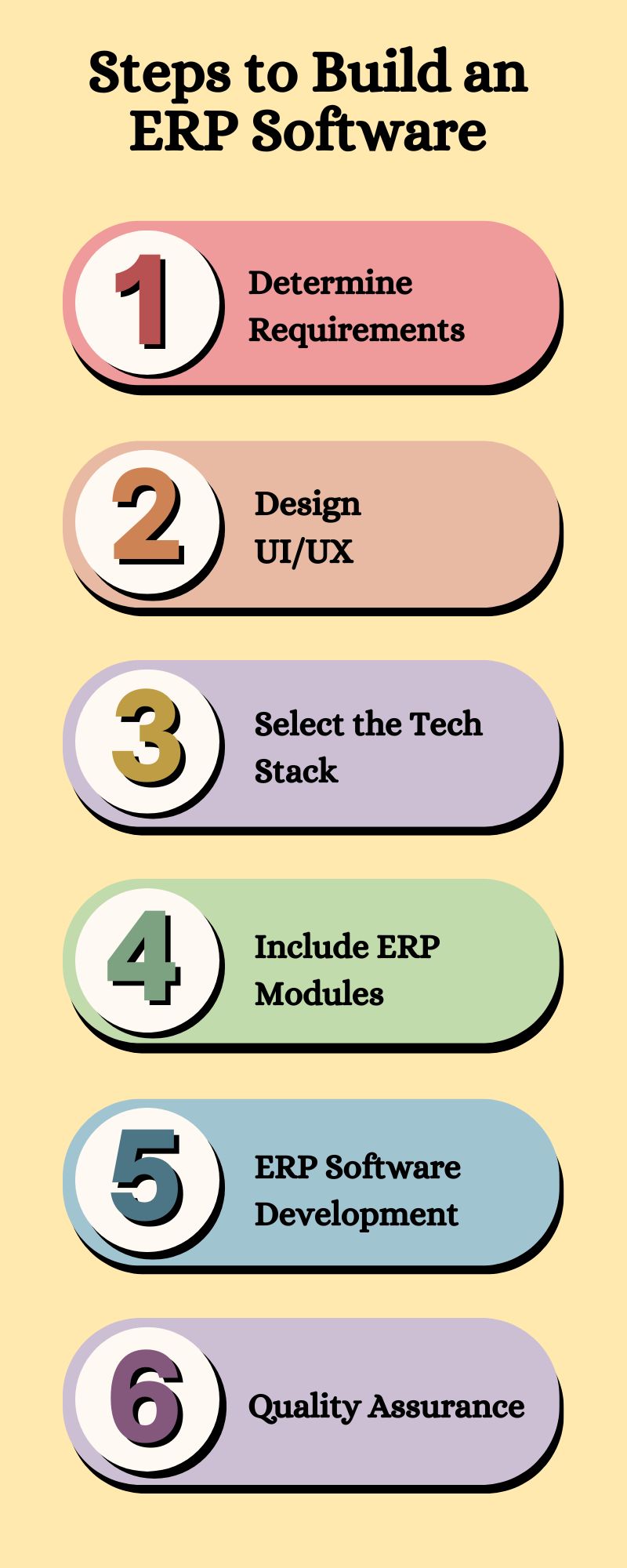Numerous tasks are involved in running a business, ranging from accounting to risk management and supply chain management to others. Businesses often utilize many systems to handle various aspects of these activities, which leads to insufficient and error-prone procedures. Enterprise Resource Planning (ERP) was created to solve these problems by offering a centralized platform for efficiently managing multiple business operations.
Businesses have also trusted and look forward to new technology to fulfill their ever-changing needs and simplify day-to-day operations. An ERP software application can be beneficial and necessary for today’s business. According to reports, the worldwide ERP market is expected to grow to $103.95 billion by 2029. However, creating an ERP can be expensive and time-consuming as it is complex and requires several integrations. Nevertheless, customization with the help of an application development company can help provide the desired enterprise resource planning software.
What is ERP Software Development?
Enterprise resource planning (ERP) is a software that helps companies centralize and coordinate their operations and resources efficiently. It mainly contains modules for inventory management, supply chain management, accounting, and human resources that can assist companies in streamlining their operations.
Additionally, the ERP system’s flexibility and usefulness let organizations manage resources more effectively. ERP technologies have made managing massive databases easier for large organizations, but smaller businesses can also benefit from them, particularly with the increasing accessibility of cloud-based solutions.
With the assistance of a leading ERP development company, you get a custom ERP solution for your organization. These solutions bind together several business procedures and enable the flow of data between them to operate your business more smoothly. Custom ERP software can also plan, prepare, and forecast your company’s financial results while working on numerous modules and departments.
What are the Advantages of ERP Software Development?
The following are some benefits of ERP software development:
-
Isolated Modules
Using custom ERP software development services, you can develop different modules for a department within your firm. Employees from each department will understand the plethora of features and information other departments utilize. Additionally, process encapsulation ensures security and reduces the possibility of data leaks.
-
Easy to Learn
Something made just for your business is more accessible to explain than something meant for a wider audience. Moreover, the developer-approved documentation will expedite the employee training process.
-
Simple to Maintain
You can easily contact the support team to fix defects in third-party applications. When you use an enterprise resource planning application, your developers are familiar with all the system’s quirks and can swiftly resolve bugs.
-
Flexibility
The primary disadvantage of using third-party software is that it requires adjustment. Although many options are available, they can not fit every business’s requirements. Since every company is distinct, no off-the-shelf solution can address every issue you face. Custom ERP software development eliminates the need to reconstruct the product for a third-party application because it is made especially for your business.

Third-Party or Custom Solutions: Which Solution Fits Your Needs?
Entrepreneurs have two options when looking for enterprise software development. The first option is using third-party software offered through various subscription plans. Developing a custom solution for the business is the second. In this section, we’ve covered the benefits of a custom ERP solution and the drawbacks of each process.
-
Third-Party Solutions
Many ERP system applications are available from a SaaS provider and can be implemented immediately following the first payment. Turnkey solutions such as Acumatica, Sage Intacct, and SAP Business One are ideal for small and medium-sized organizations. Furthermore, large-scale systems such as Microsoft Dynamics, SAP S/4 HANA, and Oracle NetSuite are made for large organizations and enterprises.
The most painful of all the pitfalls is the training difficulty. As a small business owner, you can independently work out the program’s intricacies. However, the integration procedure could take months or even years if you are in charge of a big firm.
SAP and other software vendors can provide maintenance officers to assist your employee in becoming proficient with the program (for an extra charge). Therefore, if you’re only interested in integration services, reconsider your options before you pay for full-stack ERP software development.
Third-party solutions provide several benefits. First, you don’t have to invest your valuable time in searching for a reliable team. Secondly, you don’t have to brainstorm which architecture or design to use. Everything is completed on your behalf. Additionally, you save money and resources by not having to pay for development. Cost-effectiveness is a dubious advantage, though, depending on elements like the nature of the business, the ERP software development services provider, and your employee’s skill level.
-
Custom-made Solutions
Custom-made solutions are only constrained by your creativity if third-party solutions are restricted to what their developers intended. Think of it as a blank paper on which you can draw specific features for the sales department’s lead analysis, supply chain management capabilities, or accounting entry features. You can establish departmental synergy with a custom ERP development company.
Furthermore, third-party solutions need more functionality and provide additional features you don’t use. ERP development ensures you receive what you need if you have successfully created the feature list.
Engineers’ thorough documentation from the development phase will enable accountable employees to address unforeseen problems without involving third-party vendors. Another option is to hire a technical writer to create a thorough handbook for the entire system. This will facilitate onboarding new employees and expedite the training process.
ERP software development has several disadvantages, including cost and development time. The cost of ERP implementation is difficult to estimate because it depends on the organization’s size and your demands.
Step-by-step Process to Build an ERP Software

An ERP has made automating critical tasks and process streamlining possible for numerous businesses. Getting ERP for your company sounds exciting, but to better understand the problems and progress of your project, you must be aware of the processes involved in the ERP software development process. It involves a few crucial steps like:
-
Determine Requirements
A thorough examination of the organization’s requirements is carried out to determine the features and functionalities needed in the ERP system. This stage entails interacting with stakeholders, coordinating with many departments, and obtaining comprehensive information to identify areas for development.
-
Design UI/UX
Design is a crucial step for the success of your project. The UI/UX Design services provider will build a simple, intuitive design based on requirements. Database structure, user interfaces, and integration points with current systems are crucial elements in this phase. You should observe your competitors to discover what kinds of ERP procedures and systems they utilize.
-
Select the Tech Stack
You must select the right technology stack to build ERP software. This step decides and finalizes the technologies, frameworks, and tools used to develop the system. Choosing a platform impacts the tech stack, which is necessary since it rules the system’s functionality and scalability with other software components.
| Tech Stack Needed For ERP Software | |
| Front-end Technology | Bootstrap, JavaScript, Angular JS, React, Vue.js |
| Back-end Technology | Java, Python, Node.js, .NET |
| Database | MySQL, MongoDB, Oracle |
| Integrations | Google Workspace, Amazon S3, Amazon EC2, Elastic Search, Socket.io, Elastic Emails |
-
Include ERP Modules
You can connect and synchronize third-party integrations in the ERP module integration process. ERP software development companies include services like Office 365, allowing real-time data exchange and a complete picture of many activities. Organizations may increase operational efficiency, decision-making, and data accuracy by integrating ERP modules. In this phase, insights derived from data are supported, and appropriate resource allocation is used for strategic planning.
-
ERP Software Development
An ERP application development company will begin the development phase soon after deciding all the MVP’s features, functionalities, and requirements with you. This is an essential stage that calls for cooperation and focused work. The MVP may take several months to a year, and this time frame may extend in response to evolving needs. During development, your team will actively perform coding, module integration, user feedback, and agile development.
-
Quality Assurance
Testing is undoubtedly a critical step in the development process and is vital to ensure the control of the solution and quality assurance. Before being deployed, a solution undergoes rigorous testing to find and fix any possible problems.
Software testing service providers ensure the ERP system application works as intended and satisfies required quality standards while also assisting in the discovery of any issues, flaws, or defects in the system. They also aid in locating possible adjustment and optimization areas, lower post-deployment issues, and improve stability and dependability.
How Much Does it Cost to Install an ERP System?
Knowing the ERP development cost is crucial so businesses can adequately budget for the development process. Second, having an idea of the ERP implementation cost will aid the company in assessing and comparing various solutions. ERP software deployment may be expensive, and knowing how much it will cost can assist the company in making wise resource allocation and planning decisions.
The system’s complexity, the degree of customization, software development trends, and the company’s experience are a few variables that may affect the cost. However, the average price range for implementing an ERP system is between $30,000 and $2,50,000. It may depend more or less on what you receive for your business. Typically, the substantial ERP system cost linked to the deployment consists of:
- Fees for software licenses
- Implementation services, including testing, data migration, and project management
- Customization costs
- Infrastructure costs for hardware
- Costs for training and support
- Cost of converting data.
- Project management costs.
- Contingency funds
How Can SparxIT Assist You in ERP Software Development?
Using ERP software for your company is a complex task that needs careful planning and execution. The primary obstacles to the effective deployment of ERP systems are data conversion, system integration, customization, change management, and training. Hiring custom ERP software developers from a reputable company might aid the ERP solution’s better implementation and maintenance.
For this reason, you must collaborate with a trustworthy partner like SparxIT, the best enterprise mobile app development agency. We will assist you in overcoming these obstacles and implementing ERP systems for your organization. We provide various services for implementing ERP solutions, including planning, setting up, customization, deployment, training, and support.
Furthermore, we have skilled engineers and experienced ERP consultants with extensive knowledge of well-known ERP software, including Oracle, SAP, Dynamic 360, and Odoo. Collaborate with a leading Odoo development company to build an ERP system that meets your requirements and incorporates cutting-edge technologies like blockchain, AR/VR, and more.
Conclusion
ERP systems are vital tools for businesses of all sizes operating in diverse industries. When an ERP system is integrated correctly, it removes problems related to manual labor. It provides a centralized perspective of business activities, allowing companies to cut costs and make better decisions. Even with all the advantages of an ERP system, implementing it is always challenging. Companies must carefully assess their needs, select the best ERP software development company, create an implementation strategy, and offer enough employee support and training.




